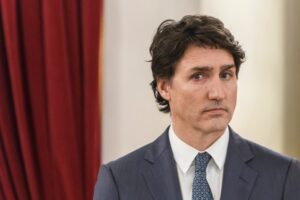Justin Trudeau Gets Brutal Political News Spelling The End Of His Tenure In Power
Canadian Prime Minister Justin Trudeau faces what many analysts believe is the definitive unraveling of his nearly decade-long hold on power. A series of polls, political defections, and mounting public dissatisfaction have created a perfect storm that now threatens to upend Trudeau’s leadership and thrust Canada into a new political era.
The latest polls indicate an unprecedented collapse in support for Trudeau’s Liberal Party, with only 21% of Canadians backing his government—matching the historically low support levels for the New Democratic Party (NDP) according to Covers. Meanwhile, the Conservative Party, led by the ascendant Pierre Poilievre, commands a formidable 43%, solidifying their position as the likely successors to power. The Conservative party, led by Poilievre, has emerged as the overwhelming favorite with election odds favoring them at -2500. The Liberal party stands at +800, just over 11 percent.
Adding fuel to the fire, Deputy Prime Minister and Finance Minister Chrystia Freeland resigned earlier this month, joining a wave of high-profile Liberal departures. Freeland’s exit not only underscores deep fractures within the party but also amplifies calls for Trudeau himself to step aside. Critics within his own ranks have become increasingly vocal, citing his inability to stem the tide of economic grievances and public dissatisfaction that have dominated the national discourse.

Chrystia Freeland
Trudeau, once hailed as the fresh-faced reformer who championed progressive ideals on the world stage, now finds himself besieged by scandals and policy missteps. His political brand has been tarnished by repeated controversies, including violations of ethics laws, blackface photos, and his handling of the SNC-Lavalin affair.

via Covers
Perhaps more damaging has been his inability to address Canada’s spiraling economic challenges. A housing crisis, overburdened healthcare system, and soaring cost of living have left Canadians clamoring for change.
The Conservative Party has seized the moment, riding a wave of discontent that parallels the populist resurgence seen in other Western democracies. Pierre Poilievre, often compared to U.S. Republicans for his rhetoric, has positioned himself as a champion of fiscal responsibility and economic revitalization.

Canadian Prime Minister Justin Trudeau is attending a joint press conference with Ukraine’s President Volodymyr Zelenskiy in Kyiv, Ukraine, on February 24, 2024
The Conservatives’ commanding lead in recent polls mirrors the sentiments of 78% of Canadians who say it is time for a new government, according to an Ipsos poll. The sentiment marks a departure from the optimism that greeted Trudeau when he first took office in 2015, ushering in a majority government on promises of “real change.”

Ottawa Ontario Canada February 12 2022. Freedom convoy Ottawa trucks signage and people protesting the Canadian governments mandates and legislation on Wellington street.
While the NDP and Bloc Québécois are unlikely to form a government, their actions could significantly influence the timeline of Trudeau’s departure. NDP leader Jagmeet Singh, once an ally in propping up Trudeau’s minority government, has announced a motion of non-confidence in Parliament. If successful, this could precipitate an election as early as 2024, well before the scheduled date in October 2025.
As Canada braces for a potential electoral showdown, the question is not just who will govern next, but how Trudeau’s legacy—will be remembered.
(FREE REPORT: Take Advantage Of Trump’s New “IRS Loophole” ASAP)


